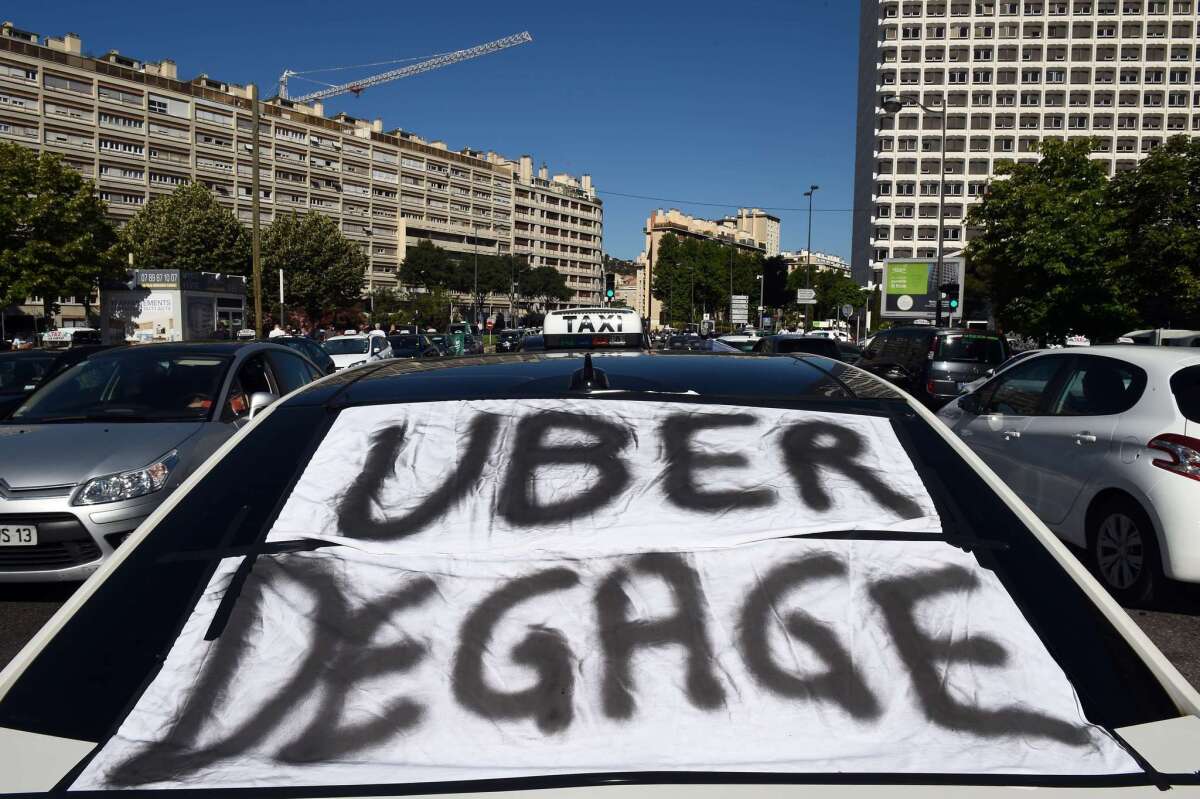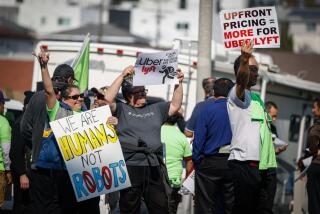UberPop service in France is suspended

A banner that translates as “Uber get out” is displayed across a taxi windshield during a June 25 protest in Marseille, France, as taxi drivers demonstrated against UberPop, a popular taxi app that is facing fierce opposition from traditional cabs.
Reporting from London — Uber announced Friday that it was suspending its low-cost ride share service in France, a week after hundreds of taxi drivers took to the streets to angrily protest the popular app.
Saying it was acting to protect its drivers but also in the “spirit of peace,” the head of Uber France announced that its operations would temporarily cease at 6 p.m..
The drivers “were victims of acts of violence in the last few days,” Thibaud Simphal told Le Monde newspaper. “We want to position ourselves in a spirit of peace and also dialogue with the authorities and show that we take our responsibilities seriously.”
The cheap ride-share business, called UberPop in France, connects passengers with unregistered drivers, a move that has been met with anger from taxi drivers who must buy an expensive license that can cost up to $270,000 and who say the competition is destroying their livelihood. Other Uber services using professional drivers were not affected by the decision, the company said.
Although ordered closed by French authorities, UberPop initially said it would not stop operating as it awaited a decision by the country’s top court.
On Friday, Simphal backtracked from that hard-line stance and suggested that the company would suspend its services until the court makes its ruling on the law that handles taxi competition, expected in September.
The riots that erupted June 25 saw dozens of cars damaged, seven police officers injured and 10 people arrested after an estimated 2,800 taxi drivers took to the streets.
In chaotic and sometimes violent scenes, cars were overturned and burning tires were set to block roads, including routes leading to major airports and train stations. Passengers were seen lugging their bags along the roads. In Strasbourg, there were reports that Uber drivers were being lured to remote pickup locations where they and their vehicles were set upon by protesters.
This week, two UberPop executives were arrested and ordered to stand trial in September on charges that include “deceptive commercial practices.”
France is no stranger to strike action, but the tension has forced the most senior politicians to speak out.
Prime Minister Manuel Valls told reporters that he welcomed Uber’s decision but that there needed to be a reform of France’s licensed taxi operation, which has a monopoly.
The country’s cab system has been criticized as being resistant to modernization, such as using GPS or accepting credit cards, and passengers often complain of difficulty finding a ride.
This is not the first time Uber has found itself facing fierce opposition to its service, which has rapidly spread to 300 cities on six continents. More than a dozen lawsuits have been filed across Europe, and some analysts said Uber needs to exercise a bit more cultural sensitivity during its fast-paced global expansion.
In France, it has been seen as an example of American free market pitted against ingrained economic protectionism.
In its defense, Uber chiefs argue that the company creates jobs, provides a valuable service to passengers and can boost tax revenue instead of encouraging unlicensed drivers to operate “off the grid.”
Simphal said the decision Friday was made only because of the violence and should not be interpreted as a defeat or sign of a change in strategy by the company, which has traditionally bowed only to courts, not protesters.
He also said all the uproar had its advantages: “All this noise has instead been publicity for the platform.”
Uber estimates that the French service has about 400,000 monthly users. Simphal said nearly 10,000 casual drivers in France have subscribed to UberPop and 4,000 of those were working last week when the protests occurred.
He praised the drivers for their “calm and exemplary attitude” and said 87% of the drivers who use the service have another job.
“UberPop offered them a real opportunity to supplement their income, which the country is sorely lacking,” he said. “Our priority now is to find a way to put these thousands of drivers on the road. It is vital for them and their families.”
Boyle is a special correspondent.
More to Read
Sign up for Essential California
The most important California stories and recommendations in your inbox every morning.
You may occasionally receive promotional content from the Los Angeles Times.










